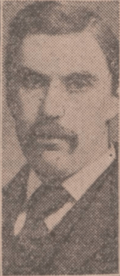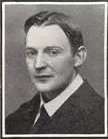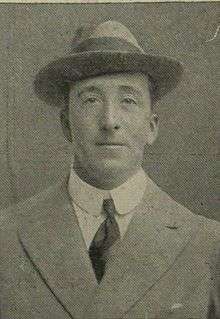Ipswich by-election, 1914
The Ipswich by-election was a Parliamentary by-election. It returned one Member of Parliament to the House of Commons of the United Kingdom, elected by the first past the post voting system.
Vacancy
Silvester Horne had been one of the Liberal MPs for the dual member seat of Ipswich since the January 1910 elections. In 1914, returning from New York, he was taken ill suddenly and died.
Previous result

| Party | Candidate | Votes | % | ± | |
|---|---|---|---|---|---|
| Liberal | Sir Daniel Ford Goddard | 5,931 | 26.2 | ||
| Liberal | Rev. Silvester Horne | 5,791 | 25.7 | ||
| Conservative | Arthur Churchman | 5,447 | 24.1 | ||
| Conservative | Bunnell Henry Burton | 5,409 | 24.0 | ||
| Majority | |||||
| Majority | |||||
| Turnout | 89.9 | ||||
| Liberal hold | Swing | ||||
| Liberal hold | Swing | ||||
In terms of a purely party vote, the votes cast for the party ticket were as follows;
| Party | Candidate | Votes | % | ± | |
|---|---|---|---|---|---|
| Liberal | Goddard/Horne | 5,757 | 52.0 | ||
| Conservative | Churchman/Burton | 5,318 | 48.0 | ||
Candidates

- 41-year-old Charles Masterman was chosen as the Liberal candidate. In 1914 he was appointed to the Cabinet as Chancellor of the Duchy of Lancaster. However under the law at the time, any MP accepting an "office of profit under the Crown" was legally required to recontest their seat in a by-election. Masterman lost his own seat at Bethnal Green, though this was not uncommon, and sought a return to parliament here.
- 32-year-old London Barrister John Ganzoni was chosen by the Unionists as their candidate. He had been in place long enough to effectively nurse the constituency. He claimed to have had a haircut in every Barber's Shop in Ipswich.[2]
- 38-year-old Australian John Scurr stood as a Socialist candidate. In 1913 he was a Socialist candidate at the Chesterfield by-election. He had also stood as Socialist candidate against Masterman at Bethnal Green. Scurr was Chairman of the London District Committee of the Dock, Wharf, Riverside and General Labourers' Union.
Masterman had personal misgiving about contesting Ipswich; "It was an area of small employers, hostile to Insurance. It was a very Protestant area, reluctant about Home Rule. The local Liberals were enthusiastic and pressed hard for him to come, and Mr. Illingworth (Liberal Chief Whip) did not see how to refuse them."[3]
Campaign
The campaign was dominated by the National Insurance Act introduced by Masterman in 1911. Both the Unionist and Socialist candidates attacked the Act. On 22 May 1914 David Lloyd George a close ally of Masterman, visited the constituency to speak for the Liberal campaign. He attacked the Unionists for their behaviour over Ulster which he considered a threat to constitutional government. Unionists had given support to a possible call to arms to resist the introduction of the Liberals Irish Home Rule Bill. He also emphasised the benefits of National Insurance and Old Age Pensions.[4]
Result
This was the last contested by-election to take place before the outbreak of the Great War, after which, the main political parties agreed an electoral truce.

| Party | Candidate | Votes | % | ± | |
|---|---|---|---|---|---|
| Unionist | Francis John Childs Ganzoni | 6,406 | 50.6 | +2.6 | |
| Liberal | Rt Hon. Charles Masterman | 5,874 | 46.3 | −5.7 | |
| Socialist | John Scurr | 395 | 3.1 | +3.1 | |
| Majority | 532 | 4.3 | n/a | ||
| Turnout | 91.4 | +1.5 | |||
| Unionist gain from Liberal | Swing | +8.3 | |||
- Change of vote share and swing calculated from the 1910 party ticket vote.
Scurr threatened that he would continue to harass Masterman by standing against him wherever he was a candidate.[5] He never stood against Masterman again.
Aftermath
Masterman's defeat forced him to resign from the Government. At the 1918 elections he unsuccessfully fought West Ham Stratford. A general election was due to take place by the end of 1915. By the autumn of 1914, the following candidates had been adopted to contest that election. Due to the outbreak of war, the election never took place.
| Party | Candidate | Votes | % | ± | |
|---|---|---|---|---|---|
| Unionist | Francis John Childs Ganzoni | ||||
| Liberal | Sir Daniel Ford Goddard | ||||
At the 1918 general election, Scurr unsuccessfully contested the Conservative Party safe seat of Buckingham. The Ipswich constituency had its representation cut from two to one member.
| Party | Candidate | Votes | % | ± | |
|---|---|---|---|---|---|
| Unionist | Capt. Francis John Childs Ganzoni | 13,553 | 53.5 | +2.9 | |
| Labour | Robert Jackson | 8,143 | 32.1 | +29.0 | |
| Liberal | George Hay Morgan | 3,663 | 14.4 | −31.9 | |
| Majority | 5,410 | 21.4 | +17.1 | ||
| Turnout | 67.9 | −23.5 | |||
| Unionist hold | Swing | n/a | |||
- Ganzoni was the endorsed candidate of the Coalition Government.
References
- Craig, F. W. S. (1974). British parliamentary election results 1885-1918 (1 ed.). London: Macmillan.
- Wikipedia: en.wikipedia.org
- Who's Who: www.ukwhoswho.com
- Debrett's House of Commons 1916